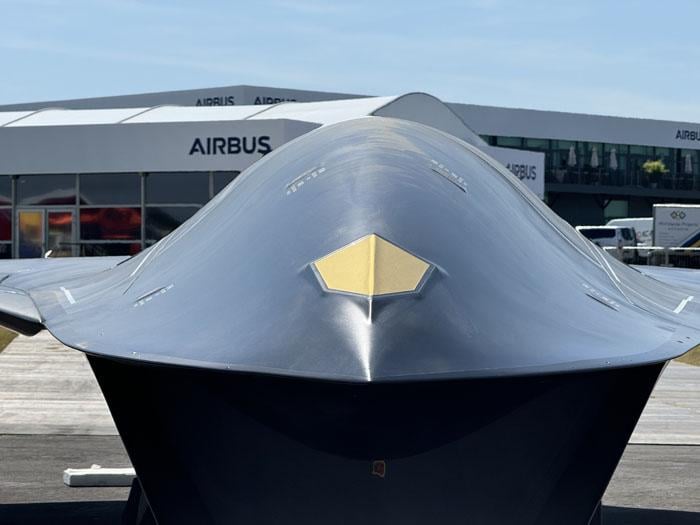
Airbus Defense and Space has brought a model of its Wingman concept to Farnborough Airshow.
LONDON—Airbus sees the potential for new defense cooperation opportunities to emerge with the UK, given the newly elected government in London has signaled it will seek to strengthen relations with the European Union.
“I’m hearing very early encouraging statements from the new British government in terms of reaching back out to the continent. That might enable discussions,” said Michael Schoellhorn, head of Airbus Defence and Space, on the eve of Farnborough Airshow.
The British government that took office July 5 has pledged to strengthen ties strained after the UK exited the EU following the "Brexit" referendum. London aims to negotiate a new security treaty with the EU and seek a new bilateral defense agreement with Germany, the British armed forces minister Luke Pollard said July 18.
Schoellhoern said July 21 that there may be opportunities for collaboration between the two big future combat aircraft programs being pursued in Europe, even if that does not involve combining them into a single effort. The UK has teamed with Italy and Japan under the Global Combat Air Program (GCAP), while Germany, France and Spain are pursuing the Future Combat Air System (FCAS) effort. Both involve developing a next-generation fighter, but also other systems.
“I see at least two-three connecting points, even if we end up having two different fighters in Europe,” Schoellhorn said. Those include potential cooperation on weapons, largely through the European missile house of MBDA that has Airbus, BAE Systems and Leonardo among its shareholders, he said, but also on collaborative combat features such as connectivity or potentially autonomous systems.
Schoellhorn doubled down on Airbus’ long-held position that Europe pursuing two rival combat aircraft programs is not ideal. The motivation for the two programs has been largely political and, he said, “that hasn’t fully gone away.”
Asked about U.S. discussions over the direction of its future fighter, the Next Generation Air Dominance (NGAD) project, Schoellhorn suggested that may reflect a wider debate around how crewed and uncrewed capabilities should be balanced in the future. Airbus leads the remote carrier autonomous air vehicle work under FCAS and, at ILA Berlin in June, unveiled one such concept it calls Wingman.
The NGAD discussion does not just reflect budget pressures, Schoellhorn suggested. “My view: it also has to do with the [concept of operations] of what the sixth generation will mean. What will be done by uncrewed systems, what will be done with manned systems, and how will it all fit is not yet clear,” he said.
“It might well be that everyone comes to the conclusion we need to slow down a bit and do more of a spiral development," he added.
